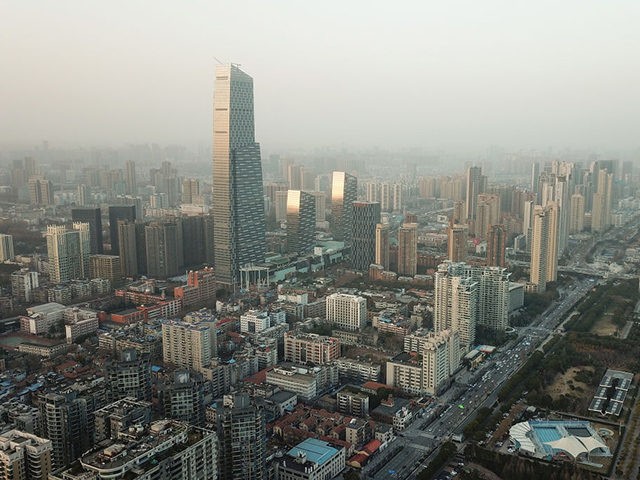The Wall Street Journal (WSJ), citing an alleged previously undisclosed U.S. intelligence report Sunday, claimed three researchers working for the Wuhan Institute of Virology (WIV) were hospitalized with coronavirus-like symptoms in November 2019.
Other anonymous sources in the WSJ report alleged the U.S. has quietly amassed even more evidence that supports the theory of the Chinese coronavirus originating at the Chinese virology lab. The virus began infecting people in Wuhan city in late 2019, multiple studies have concluded; no evidence exists of prior infections by the virus anywhere else before those identified in Wuhan.
The Trump State Department published a fact sheet claiming, similarly, that several Wuhan researchers became ill in fall 2019, several weeks before Chinese officials confirmed the first coronavirus cases in the city, but the newly obtained intelligence report allegedly contains more details on the same topic. The WSJ did not publish the alleged report itself, merely paraphrasing it.
“The U.S. government has reason to believe that several researchers inside the WIV became sick in autumn 2019, before the first identified case of the outbreak, with symptoms consistent with both [Chinese coronavirus] and seasonal illnesses,” the January 15, 2021, State Department fact sheet said.
The alleged report disclosed by the WSJ on Sunday, claimed to be based in part on information “provided by an international partner,” specified that three WIV researchers became sick enough to require hospitalization in November 2019.
“The information that we had coming from the various sources was of exquisite quality. It was very precise. What it didn’t tell you was exactly why they got sick,” one of the WSJ’s anonymous sources said.
The WSJ quoted former State Department official David Asher observing in March that “three people in highly protected circumstances in a level three laboratory working on coronaviruses” simultaneously requiring hospitalization for a respiratory infection that had nothing to do with their work at the WIV seems like a very unlikely coincidence.
On the other hand, skeptics of the theory that the Chinese coronavirus leaked from the WIV say three hospitalizations does not constitute “smoking gun” proof, especially since people who get sick in China are allegedly prone to immediately seeking treatment at a hospital, given the nature of the communist-run healthcare system.
The WSJ noted that the Biden administration, while accusing its predecessor of attempting to “spin” the information, has not denied any of the information in the public fact sheet. The Biden State Department refused to comment on “purported intelligence matters” when Fox News asked about the WSJ report Monday.
The Chinese government initially declined comment, but then unleashed a string of attacks on the WSJ journal report through state media on Monday. The state-run Global Times quoted the director of a WIV program denouncing the “so-called U.S. intelligence report on sick staff at the Wuhan Institute of Virology” as an “outright lie that came from nowhere.”
“Those claims are groundless. The lab has not been aware of this situation [sick researchers in autumn 2019], and I don’t even know where such information came from,” Yuan Zhiming of the Wuhan National Biosafety Laboratory at the Wuhan institute said.
The Global Times implied the disclosure of the U.S. intelligence report, and the growing credibility of the lab-leak hypothesis across the Western world, as a scurrilous attempt to manipulate the World Health Organization’s (W.H.O.) World Health Assembly meeting this week.
Another Global Times article on Monday quoted Chinese Foreign Ministry spokesman Zhao Lijian — infamous for spreading his own unsubstantiated conspiracy theories that the coronavirus came from an American bio-weapons lab — rejecting the WSJ report.
Zhao brought up his conspiracy theory again in the course of doing so:
There have been more reports indicating that the virus and epidemic had occurred in many places as early as the second half of 2019. Questions over the U.S. military lab in Fort Detrick as well as the U.S. real intention in opening more than 200 bio labs around the world have also drawn global attention.
“The U.S. continues to hype the lab leak theory. Is the real intention to express concern over the virus origin or to divert attention?” Zhao asked ominously. His sole evidence that the WSJ report could not be true was a statement issued by the WIV in March that none of its researchers contracted the coronavirus.
No evidence exists that any coronavirus cases originated in or around the U.S. Army research laboratory in Fort Detrick, Maryland, prior to the cases documented in Wuhan. Chinese officials have presented no authentic evidence to support their continued accusations against the Maryland facility.
The Global Times falsely claimed the joint Chinese-W.H.O. investigation in Wuhan this year concluded the lab leak theory was a “baseless argument from the beginning.” In truth, the W.H.O. team merely ranked various theories in order of “likelihood” and rated lab leak “least likely.” It did not address the potential of an intentional release of coronavirus from the laboratory.
W.H.O. immediately backed away from its own report when Beijing began trumpeting it as vindication, with Director-General Tedros Adhanom Ghebreyesus clarifying that no definite conclusions about the origin of the coronavirus could be drawn, and the lab leak theory merited “further investigation, potentially with additional missions.”
The growing energy around the lab leak hypothesis is due, in part, to scientists around the world questioning excessive Chinese political interference with the W.H.O. investigation. Some dismissed the report as an outright fraud, while others — like Tedros himself — noted the Chinese government simply refused to provide the raw data investigators needed.
Skeptical scientists have also noted the W.H.O.-China investigation was very light on evidence for the supposedly “most likely” explanation that the coronavirus developed naturally and was passed along to humans by either its progenitor species or an intermediary. The Chinese state should be very eager to provide evidence for the natural-origin theory, so the dearth of such data has raised suspicion.

COMMENTS
Please let us know if you're having issues with commenting.